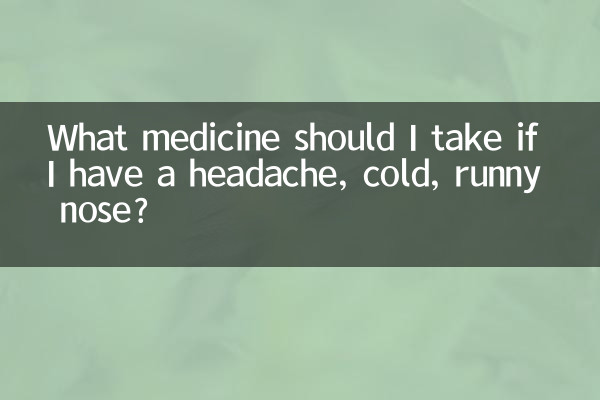What medicine should I take if I have a headache, cold, runny nose?
The weather has changed frequently recently, and respiratory diseases such as colds, headaches, and runny noses are more likely to occur, which has become a hotly discussed health topic across the Internet. Many netizens have asked on social platforms and search engines "What medicine should I take for a headache, cold and runny nose?" This article will provide structured answers based on popular discussions and medical advice in the past 10 days.
1. Common symptoms and corresponding drugs

According to recent discussions on the Internet, colds are often accompanied by the following symptoms. You can refer to the following table to choose medicine:
| symptom | Recommended medicine | Function description |
|---|---|---|
| Headache/Fever | Ibuprofen, acetaminophen | Antipyretic, analgesic, relieve discomfort |
| Stuffy nose/runny nose | Loratadine, pseudoephedrine | Anti-allergic, shrink nasal blood vessels |
| cough | Dextromethorphan, Guaifenesin | Antitussive or expectorant |
| Body aches | Compound paracetamol (Rugankang) | Comprehensive relief of cold symptoms |
2. Medication precautions that are hotly discussed on the Internet
1.Avoid duplication of medications: Recent hot search cases show that some netizens have suffered liver damage due to taking multiple cold medicines at the same time. It is necessary to pay attention to the ingredients of compound preparations, such as acetaminophen, not exceeding 2g per day.
2.Use with caution for special groups: Pregnant women, lactating women and children must follow medical advice when taking medication. For example, ibuprofen is not suitable for late pregnancy.
3.Chinese medicine selection: Chinese patent medicines such as Lianhua Qingwen Capsules and Isatis Root are highly discussed on social platforms, but they need to be used based on syndrome differentiation.
3. Answers to recent hot questions
| High frequency problem | Professional reply |
|---|---|
| How long does it take for the medicine to take effect? | It usually takes effect in 30 minutes to 2 hours. If symptoms persist for 3 days and do not relieve, you should seek medical attention. |
| Can it be combined with vitamin C? | It can be supplemented in moderation, but the therapeutic effect is limited |
| Are antibiotics needed? | A common cold does not require antibiotics, but a doctor’s judgment is required when combined with bacterial infection. |
4. Auxiliary relief methods (hotly recommended by the entire network)
1.diet conditioning: Recipes such as ginger brown sugar water and snow pear stewed white fungus have received millions of likes on the short video platform.
2.physical therapy: Steam inhalation (with peppermint or eucalyptus essential oil) can relieve nasal congestion. The related topic has been read more than 50 million times.
3.life advice: Maintain 7-8 hours of sleep every day and indoor humidity of 50%-60% is appropriate.
5. Situations requiring immediate medical treatment
According to recent popular science on medical accounts, you should seek medical attention promptly if the following situations occur:
- High fever exceeding 39℃ lasting for 24 hours
- Trouble breathing or chest pain
- Confusion
- Symptoms persist for more than 10 days without relief
Summarize: Cold medicines need to be chosen symptomatically, and the "mixed medicines" and "home remedies" that have been hotly discussed on the Internet recently are risky. It is recommended to save this structured medication guide to scientifically cope with the cold season. If symptoms worsen or new symptoms appear, you should consult a professional doctor promptly.

check the details

check the details